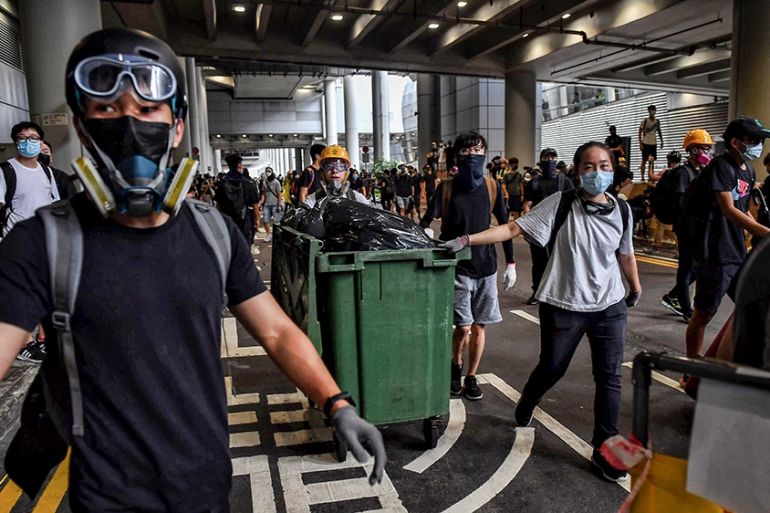Fitch Ratings downgrades Hong Kong as protests drag on
Ratings agency says Hong Kong’s growing integration with mainland China will present greater challenges over time.

Global credit rating agency Fitch downgraded Hong Kong‘s long-term rating on Friday to AA from AA-plus following months of unrest and protests in the Asian financial hub.
Fitch said in a statement its outlook for Hong Kong‘s ratings has turned negative, meaning more downgrades may be on the way.
Keep reading
list of 4 itemsAs US inflation ticks back up, it could impact the presidential election
Will the US unemployment rate continue at historic lows?
The UK’s new minimum wage ‘badly needed’ but many calling for more
The occasionally-violent protests have roiled the financial centre as thousands chafe at a perceived erosion of freedoms and autonomy under Chinese rule.
Fitch said it expects the “one country, two systems” framework to remain intact, but added that “the gradual rise in Hong Kong’s economic, financial, and socio-political linkages with the mainland implies its continued integration into China’s national governance system, which will present greater institutional and regulatory challenges over time.”
In a statement, Fitch said that these developments are consistent with a narrowing of the sovereign rating differential between Hong Kong and that of mainland China, which is lower, at A+ with a stable outlook.
The rating downgrade comes as Hong Kong braces for more demonstrations this weekend, with protesters threatening to disrupt transport links to the airport, after embattled leader Carrie Lam’s withdrawal of a controversial extradition bill failed to appease some activists.
“The Negative Outlook reflects our view that even with concessions to some protester demands, a degree of public discontent is likely to persist,” Fitch said.
“Ongoing events have also inflicted long-lasting damage to international perceptions of the quality and effectiveness of Hong Kong’s governance system and rule of law, and have called into question the stability and dynamism of its business environment.”
The anti-government protests began in March amid fears that Beijing is eroding the autonomy granted to Hong Kong when it was handed back to China in 1997. China denied the charge of meddling and said Hong Kong is an internal affair.
Fitch also lowered its real gross domestic product growth forecast for Hong Kong to zero percent, implying an outright contraction during the second half of this year.
“Hong Kong is estimated to have already entered a technical recession in the third quarter of 2019,” Rajiv Biswas, APAC chief economist at IHS Market, told Al Jazeera.
The country’s near-term economic outlook continues to be clouded by the combined effect of disruptions to commercial activity caused by political protests as well as the continuing US-China trade war, he added.
Hong Kong had tried to address these negative shocks by announcing a $2.4bn stimulus package on August 15.
“With its very strong fiscal position, the government of Hong Kong has considerable fiscal capacity to deliver further fiscal stimulus measures,” Biswas said.
However, he cautioned that the near-term outlook for Hong Kong’s economy in late 2019 and early 2020 remains “very weak”, especially if protests continue to disrupt retail and tourism sector activity.
Fitch said it expects Hong Kong‘s financial buffers to remain intact, although it anticipates that the region’s revenue will underperform budget forecast.